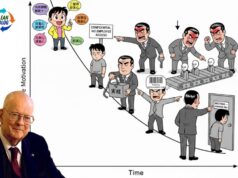A few random thoughts from being on the couch all day Sunday, catching up on work and watching a bit of NFL football. One, a thought about Jay Leno, Conan O'Brien and the “PDCA” cycle, the other about a pizza maker following GM's lead with a “mea culpa” TV ad (I might blog about that for tomorrow afternoon).
One thing that stood out, flipping channels to news during the commercial, was the “BREAKING NEWS” nature of the whole Jay Leno and Conan O'Brien situation. It is just a TV show. It's the most important story in the world to CNN? Really?
So NBC ran a pretty bold experiment, moving Jay to a weeknightly 10 PM show and putting Conan in the Tonight Show slot. Hence the “Plan Do Check Act” cycle (aka the Deming Cycle, aka the Shewhart Cycle) began (at least in my made-up “Lean TV world).
Plan: There must have been some evidence or research this would work, that people would watch Jay Leno at 10 PM and Conan would get good ratings (or at least a younger demographic) at 11:35 PM.
Do: NBC implemented the plan.
Many organizations and leaders stop at this point. They either just “Do” or they Plan and Do and assume their plans are good and they will work.
Check: The ratings were abysmal for both shows (at least the TV industry has frequent measures, even if they have news judgment). The data proved the experiment was not working. Many would be stubborn and claim the decision had been a good one (of course, maybe it just required more time — that's the judgment call of when do you give up and call the experiment over versus pressing on?).
Act: NBC clearly reacted and said they are going to try something new. That's an interesting response to me, when the knee-jerk reaction might have been to move Jay back to 11:35, firing Conan. Instead, it's Jay at 11:35 and Conan now at 12:05.
That's a somewhat pop-culture PDCA cycle, even if I doubt the networks think Lean (although in the fictional “30 Rock” world, they have Six Sigma forced on them by TV-land GE).
If you’re working to build a culture where people feel safe to speak up, solve problems, and improve every day, I’d be glad to help. Let’s talk about how to strengthen Psychological Safety and Continuous Improvement in your organization.









I wouldn’t call it pop culture, because this is a real business with real revenue and this is a genuine market PDCA.
I give them a huge amount of credit. Everyone in the world will know you screwed up, so to speak. I think the easy thing to do is tell yourself it needs more time and just stick your head in the sand to ignore the problem. But they are willing to make the change.
I’m totally speculating here, which I really hate to do, but I wonder: did they set a deadline on when they could come back and evaluate the decision? I assume they did not. But this can be a real problem. What if some people thought that it would take a year for the changes to really catch on. The famous creation of the Marlboro Man that helped drive Marlboro to the top (sorry, not promoting smoking here) took 18 months before they really saw progress. They almost pulled the plug after one year. If they had, the benefits would have been lost. I assume (again, hate to assume here) that someone just decided “it’s been long enough.” I assume it was likely someone that didn’t have much vested in the original decision.
So the lesson for folks: define your Check point as both measurable (how will you know) and time-bound (when will you check). Sometimes checking too early will give you false results.
Jamie Flinchbaugh
http://www.jamieflinchbaugh.com
Using the PDCA model sends a message that “it’s just business” and I pat them on the back for that. The fact that it was “breaking news” is very odd. I wonder “breaking important news” to whom?
Thanks for your posts; keep up the information flow and have a great week.
Debbie
I appreciate your mapping this whole affair into a PDCA cycle, Mark. (I agree, by the way: How important was all this, really, compared to other news that really affects people in the world? Is this footnote or front page, folks?)
If this were a proper implementation of PDCA in a true lean organization, the failure would have prompted an examination of why the experiment failed. They clearly had a hypothesis that this would be a successful business move and that hypothesis was clearly wrong. What was the root cause, and how do you prevent recurrence? Why was the hypothesis or the execution of the experiment flawed? Poor marketing or test group data? Selective interpretation of the data? Groupthink? Leadership hubris?
If this step is not conducted correctly, NBC will not have fixed a potentially systemic flaw. Just fire Jeff Zucker or the very persuasive speaker in that scheduling brainstorming session and everything’s cool? How do you keep their replacements’ egos in check or proof test the next zany idea without killing it?
Seems true PDCA is AWOL at NBC. Zucker will be the new gaffer on a Ukranian public access channel and nobody at NBC will ever, ever, EVER screw with Leno or his time slot. Problem solved!
.-= Jeff Fuchs ´s last blog ..News Feed Update for 30 December 2009 =-.